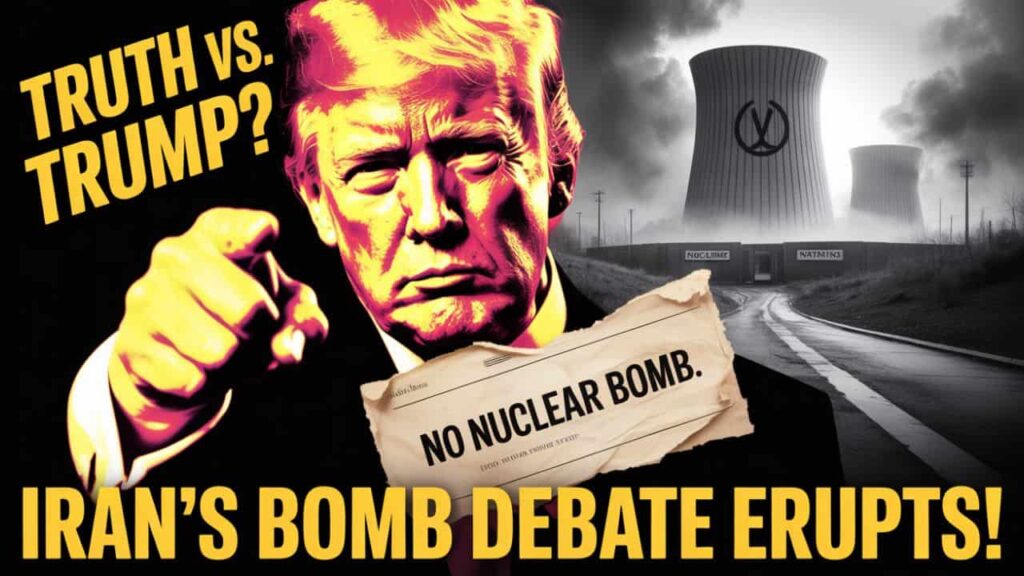In a sharp clash of perspectives, former U.S. President Donald Trump recently dismissed the assessment of American intelligence agencies that Iran is not building a nuclear weapon. His remarks have reignited global fears and debates surrounding the Iran nuclear bomb—a subject that remains a flashpoint in international relations, especially in the Middle East.
Table of Contents
Intelligence Community vs. Political Claims
Earlier this year, Tulsi Gabbard, the Director of National Intelligence and a former congresswoman, testified before Congress. She clearly stated that the U.S. intelligence community “continues to assess that Iran is not building a nuclear weapon and Supreme Leader Khamenei has not authorized the nuclear weapons program he suspended in 2003.”
This assessment echoed earlier intelligence reports under both the Biden and Trump administrations. In particular, a November report concluded that while Iran has ramped up uranium enrichment and developed advanced centrifuges, there is no evidence that the country has reactivated efforts to build an Iran nuclear bomb.
Trump’s Contradiction and Political Alignment
Despite these findings, Trump publicly rejected the intelligence summary while returning from the G7 summit. “I don’t care what she said,” he told reporters, claiming that Iran was “very close” to having a nuclear bomb. This stance aligns him more closely with Israeli Prime Minister Benjamin Netanyahu, who has repeatedly warned that Iran poses an existential threat to Israel’s security.
Trump’s remarks follow a pattern from his first term, during which he often dismissed intelligence assessments in favor of more politically advantageous narratives—most notably in 2018 when he sided with Vladimir Putin over U.S. intelligence regarding Russian interference in the 2016 election.
Gabbard Pushes Back: “We Are on the Same Page”
Interestingly, Tulsi Gabbard seemed to downplay the discrepancy in an interview with CNN, stating, “President Trump was saying the same thing that I said.” However, her previous testimony included a firm declaration that Iran was not pursuing an Iran nuclear bomb.

Gabbard, a military veteran who endorsed Trump after leaving the Democratic Party in 2022, now finds herself in a politically sensitive role, balancing loyalty to the administration with the credibility of the intelligence community.
IAEA Warning Adds Nuance to the Threat
The head of the International Atomic Energy Agency (IAEA) has warned that Iran now possesses enough enriched uranium to build several nuclear bombs if it chooses to do so. Although Iran insists its nuclear program is for peaceful purposes, the stockpile’s rapid growth is causing anxiety among Western analysts and policymakers.
This nuanced position—no current Iran nuclear bomb development, but a rapidly growing capability—illustrates why the topic remains so contentious.
The Deep State Narrative Returns
The controversy doesn’t end with nuclear claims. Trump’s immigration policy has also conflicted with intelligence findings. He cited the 1798 Alien Enemies Act to deport Venezuelan migrants, alleging ties between the Tren de Aragua gang and the Venezuelan regime—claims that were not supported by an April intelligence report.
Gabbard later fired the two veteran intelligence officials involved in that report, fueling suspicions of political retaliation. A White House statement backed Trump’s actions, calling them “historic steps to safeguard our nation.”
Strategic Implications: Why the Iran Nuclear Bomb Claim Matters
The implications of the Iran nuclear bomb debate stretch far beyond Capitol Hill. Misjudging Iran’s nuclear ambitions could lead to preemptive military action, disrupt oil markets, or spark a wider regional war. On the other hand, ignoring legitimate concerns could allow Iran to progress unchecked.
With global powers like Russia and China also navigating alliances in the region, the narrative surrounding Iran’s nuclear capability carries global consequences.
Iran Nuclear Bomb: Frequently Asked Questions (FAQ)
Is Iran currently building a nuclear bomb?
According to U.S. intelligence and the IAEA, Iran is not currently building a nuclear bomb, though it possesses the materials and infrastructure that could be used to do so.
What did Donald Trump say about Iran’s nuclear program?
Trump claimed that Iran was “very close” to having a nuclear bomb, contradicting U.S. intelligence assessments.
What is the role of Tulsi Gabbard in this issue?
Gabbard, the current Director of National Intelligence, stated in testimony that Iran is not building a nuclear weapon. However, she later claimed she agreed with Trump’s views.
Has Iran violated international nuclear agreements?
Iran has exceeded uranium enrichment limits set by the JCPOA, the nuclear deal from which Trump withdrew in 2018, but it maintains its nuclear program is peaceful.
Conclusion: Parsing Truth from Politics
The ongoing dispute over the Iran nuclear bomb is not just about uranium and centrifuges—it’s about the credibility of intelligence, the politicization of national security, and the future of stability in the Middle East.
As conflicting narratives unfold between intelligence officials and political leaders, the need for clear-eyed, evidence-based analysis has never been more critical.
📌 Visit www.documentarytimes.com for more in-depth geopolitical analysis.
Wow, tthis ppost iis good, mmy youngerr sister iss analyzing these things, so I amm going tto telll her.